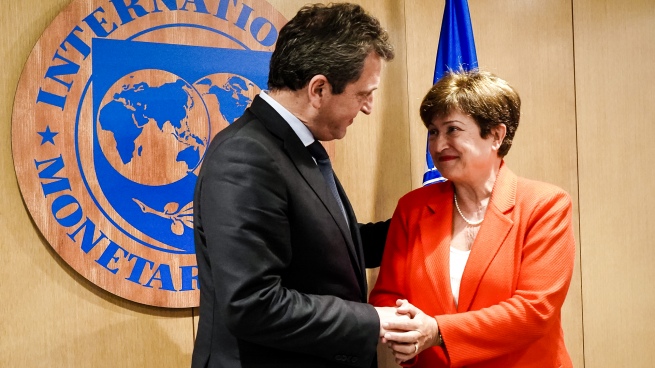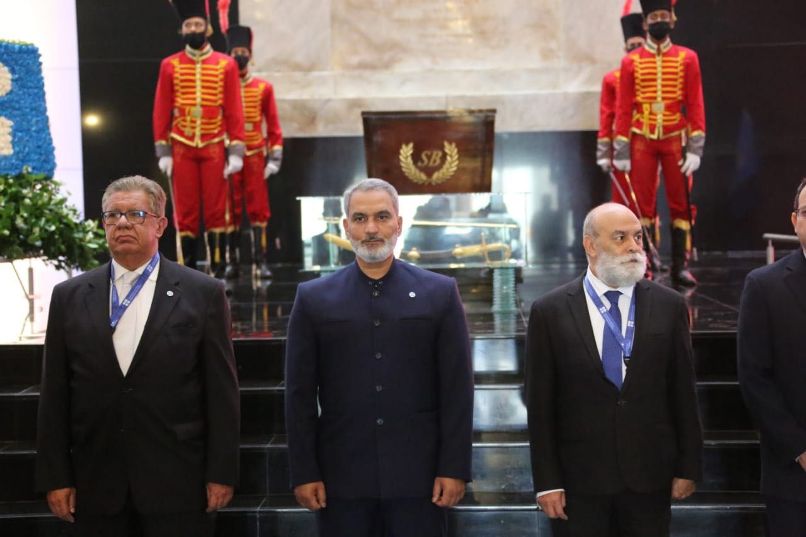The meetings held last Monday in Washington as part of the tour led by the Minister of the Economy, Sergio Massa, led to the head of the International Monetary Fund (IMF), Kristalina Georgievato highlight this Wednesday that “it is a good sign” that the entire Argentine government is focused on implementing the agreed program, by which the debt of US $ 44,500 million contracted by the management of Mauricio Macri was refinanced.
“I was impressed by the composition of the team. Massa participated in the meeting together with the president of the Central Bank (Miguel Pesce) and key people from his team, and that it is a good sign that the entire government is focused on implementing the program“, said the managing director of the IMF in an interview broadcast on YouTube.
“He recognized, and so did I, seriously, that the problems facing Argentina are very significant,” Georgieva said of what was discussed with Massa.

“In top of the list is inflation, which is devastating, especially for poor people in Argentina“, he added.
“The conversation was fundamental and extended,” Georgieva pointed out, emphasizing: “I left with the feeling that we have a partner that we can work well with.”
The IMF is analyzing the fulfillment of the goals for the second quarter, and, in this sense, the Argentine Government promised to reduce the primary deficit to 2.5% of GDP in 2022; to 1.9% for 2023 and 0.9% for 2024.
Upon returning to the country, Massa met on Tuesday with President Alberto Fernández at Casa Rosada to analyze the scope of the tour he carried out in the United States.
The work meetings of the head of the Palacio de Hacienda with US government officials, such as Treasury Secretary Janet Yellen, and investors and businessmen from that country were highlighted.

In turn, he informed the President of the progress in negotiations with international credit organizations, after meetings with Georgieva and with the president of the Inter-American Development Bank (IDB), Mauricio Claver-Carone.
In the meeting with the latter, Massa managed to get said body release credits for US$ 3,000 millionof which US$1,200 will go to reserves (US$500 million will be disbursed on September 30 and the rest on December 30 of the current year).
“The IDB’s support is very important because of what it represents for the accumulation of reserves and for many provinces in road works, for tourism, and works that have to do with water, sewage and housing,” he said.
As for the meeting with Yellen, it was not scheduled on the minister’s initial agenda, so his appearance – adviser David Lipton was present – was interpreted as a sign of support, ahead of the imminent vote in the board of the body of the second review of the IMF program, where the US is the main shareholder.

After that, Massa summed up in a tweet that it was a “very positive meeting”and expressed confidence in soon having an exchange of tax information between the two countries.
Among other topics discussed with Yellen, he delved into the AFIP and IRS agreement for the application of the Tax Compliance Law of Foreign Accountson which “all the technical work is finished and ready to be implemented when the agreement is signed.”
Once the tour was over, the head of Banco Nación, Silvina Batakis, who participated in the meeting with Georgieva, stated in radio statements that “the IMF recognized the efforts of Argentina for increasing its reserves, as well as for trying to be on a path of fiscal stability, and with interest rates in positive corridors”.
Meanwhile, the Argentine ambassador to the US, Jorge Arguellowas “optimistic” regarding the negotiations with the Fund, on which Massa assured that the final document will be ready “in the next few days” and, thus, there will be a “staff agreement” favorable to the country so that it can be approved by the body’s directory.
In his turn, the Secretary of Industry and Productive Development, Jose Ignacio de Mendigurenconsidered that thanks to the minister’s trip, Argentina is once again “at the negotiating table” because it was possible to “clear all doubts about the payment of commitments, that we were told that we were going to reschedule that debt ”.
In this line, the director of the BCRA, Agustin D’Attellissaid Wednesday in statements to FM 93.7 that “the tour opened several fronts” that were closed, since – he exemplified – “there was a tense relationship between the Government and the IDB and Massa was able to unlock it.”
















